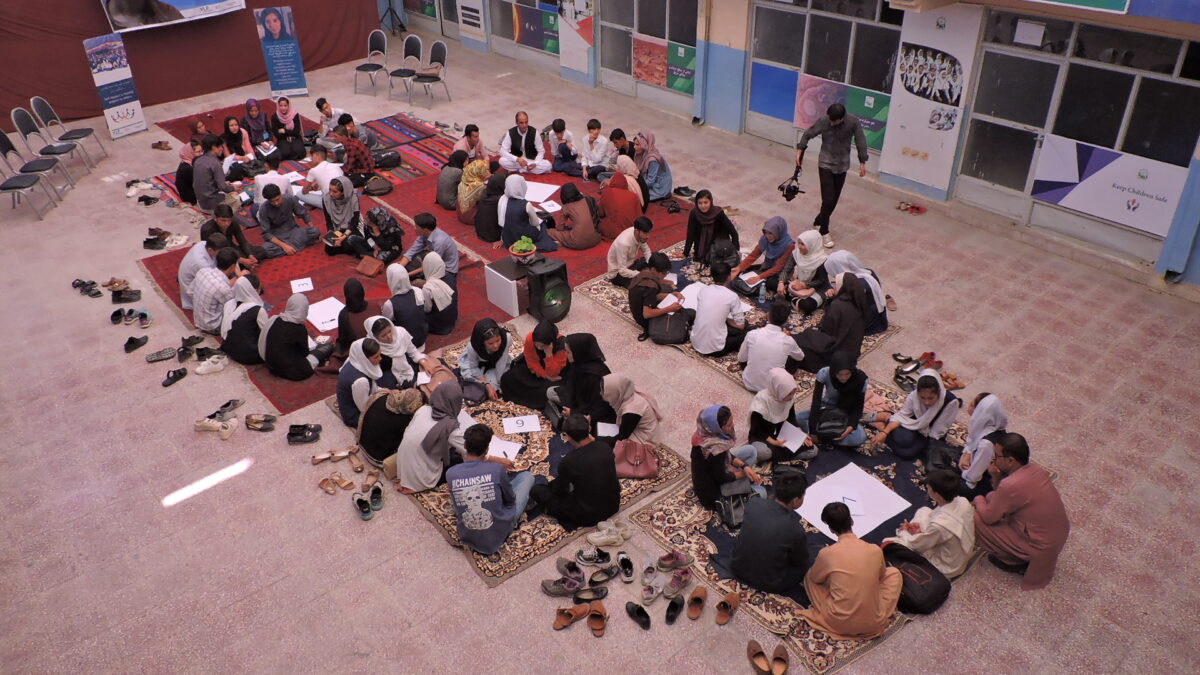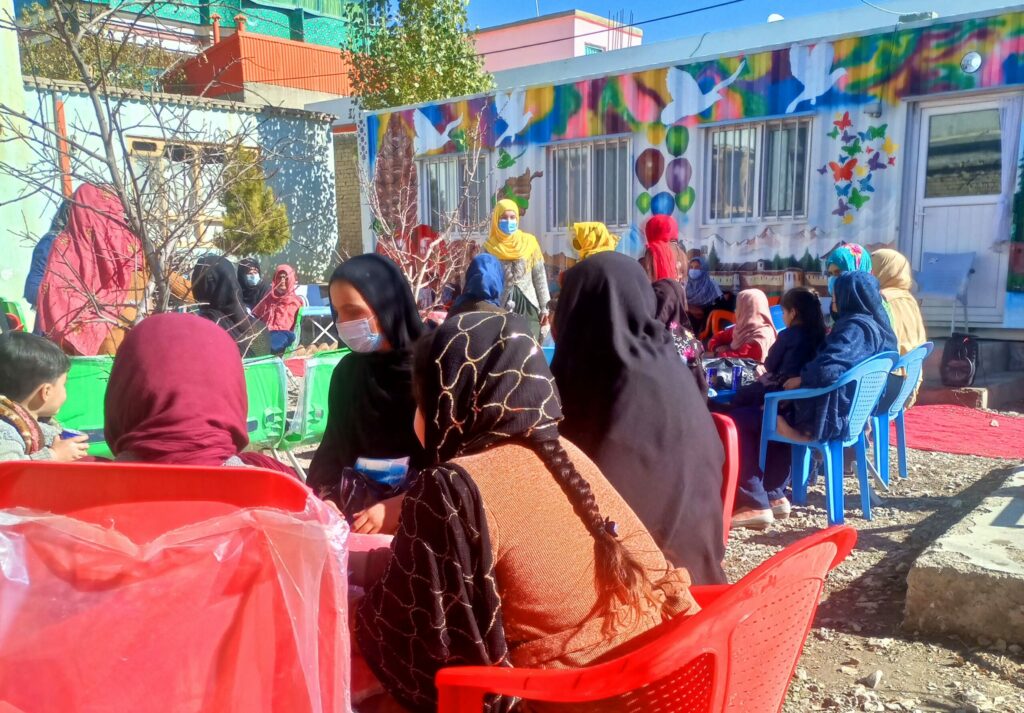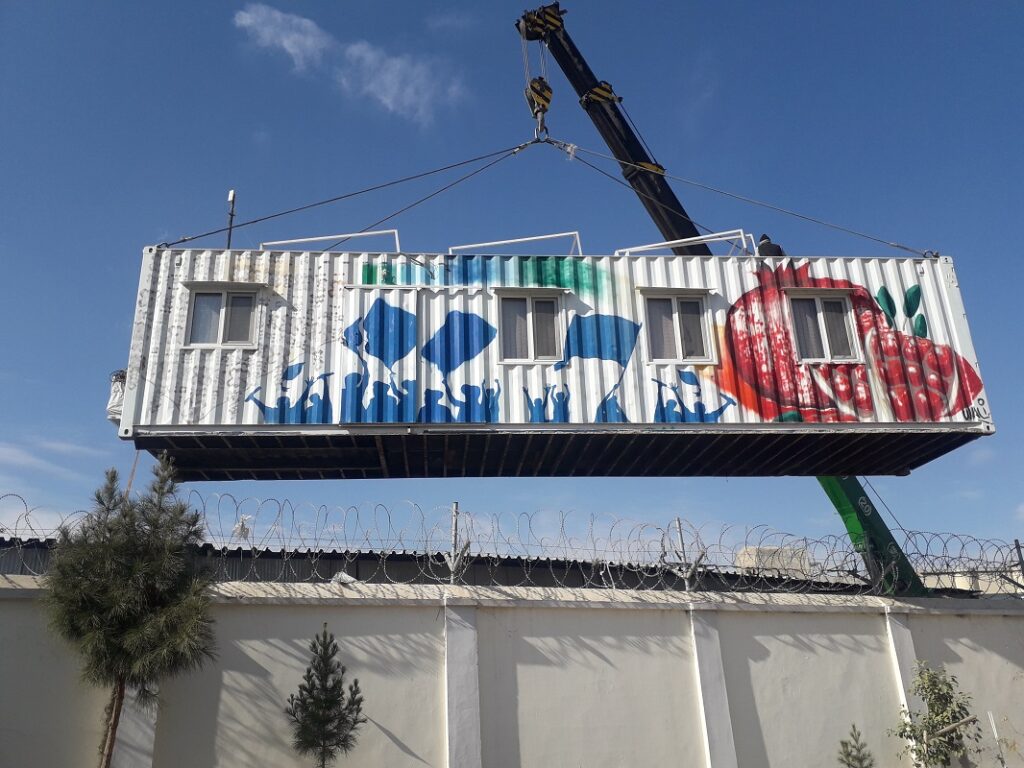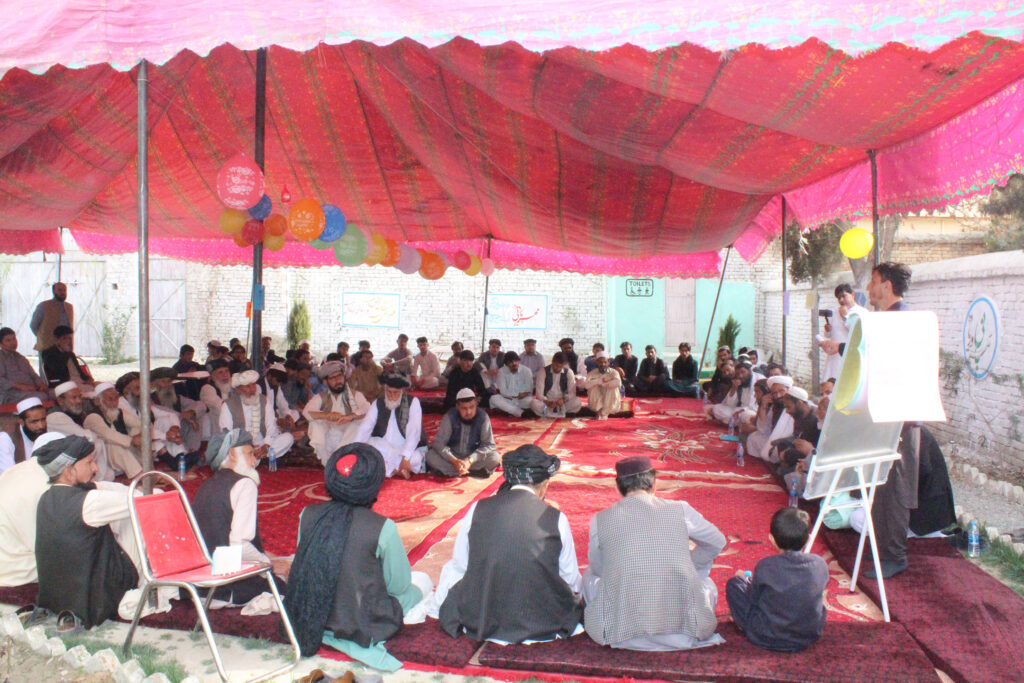
IPSO’s Involvement in Afghanistan
2011 - bis heuteIPSO’s involvement in Afghanistan dates back to Inge Missmahl’s work in the country that began in 2004, which led to the founding of IPSO g GmbH in Germany in 2008 and to establishing a locally registered non-governmental organisation in 2011. In 2022, Ipso Afghanistan became an independent local organization and has partnered with the Germany-based Ipso gGmbH on various projects in Afghanistan since then.
Projects initially focused on introducing low-threshold psychosocial services to people with high psychosocial stressors within the state health system. These projects were financed by the EU and the Federal Foreign Office. The important role that MHPSS played for social peace in a country that had been wracked by violence and insecurity for more than forty years led us to start developing and implementing concepts for strengthening cultural and social identity in 2013. In 2016, IPSO established a psychosocial centre in Kabul, which provides psychosocial services face-to-face in Kabul and online across the country.
18
Afghan provinces had psychosocial services in women’s shelters and family centres from 2017 to 2021
500
Participants in our advanced VBC training programme from 2011 to 2016
380
Positions for psychosocial counselors created in 2016
IPSO’s involvement is based on an intervention pyramid, which is the pyramid used in the IASC Guidelines on Mental Health and Psychosocial Support in Emergency Settings issued by the UN’s standing inter-agency committee. Our VBC approach has enabled IPSO to specialise in providing specific low-threshold psychological or psychiatric services.
The pyramid’s lowest level provides low-threshold access to activities that deal with questions of coexistence at the local community level, such as sociocultural dialogues, events focusing on specific social issues and community projects. Dialogues chaired by our trained staff provide safe environments for addressing difficult issues in families and local communities which include prejudices and harmful practices, and they also create the groundwork for behavioural changes. Sociocultural events enable the participants to network with people from other social groups, whereas small social projects initiated by the participants with support from our specials promote the implementation of improvement ideas.
Psychosocial support is provided in the next level above in the form of self-help groups, life skills groups and mediation during family conflicts. The latter, alongside individual counseling, was especially important in a project that provided mental health services in women’s shelters and family centres in 18 Afghan provinces from 2017 to 2021. The aim of the project was to psychologically stabilise women and children who were seeking protection after experiencing abuse, neglect and violence from their families and their social environments. Safe reintegration through mediation in family conflicts was often the only way to secure their long-term future. Educational work covering issues such as violence against women and girls, psychosocial stressors, and possible coping strategies to be used within the survivors’ social environments played an important role in this context.
Self-help groups created as part of the second level of the intervention pyramid strengthen the participants’ psychosocial skills and indirectly promote social cohesion within the local communities. These groups provide the opportunity to exchange experiences and proffer mutual support. This format is particularly suitable for including traumatised survivors of domestic violence, young people seeking orientation, older people who feel disconnected from society due to the many upheavals as well as members of society who find themselves marginalised. Furthermore, these support groups are also important to people who are exposed to psychologically stressful situations through their work, such as the staff deployed locally by aid organisations.
In the life skills groups chaired by our psychosocial counselors, the focus is on imparting knowledge and skills that will enable the participants to deal more successfully with psychosocial stresses during everyday life. The participants develop a better understanding of their specific life situations and they learn to activate resources that will help them, e.g. to better cope with feelings of aggression or with family conflicts. These self-help groups can also be run by people of good standing and trust in their local communities, and they receive appropriate training for this. The discussion groups provide an environment for addressing relevant social issues.
Raising awareness of mental health problems and psychosocial stressors is another important part of providing mental health support at local community level, as many people are unaware that there is a link between symptoms ranging from insomnia, over-excitement or social withdrawal up to traumatic experiences as well as psychosocial stressors such as family conflicts, displacement or grief. People who are made aware of these interrelationships can participate in a self-help group or seek individual psychosocial counseling at the next higher level of the intervention pyramid. As the donor environment is usually weighted towards either basic mental health care in the context of health services or the psychosocial dimension of peacebuilding, our IPSO projects in Afghanistan usually include one of these two focal points:
- projects whose content focuses on mental health and psychosocial support (MHPSS at the individual level)
- projects whose content focuses on psychosocial peacebuilding (MHPSS and sociocultural empowerment at the community level)

Mental health and psychosocial support
IPSO’s project work in Afghanistan initially focused on introducing low-threshold psychosocial services to people with high psychosocial stressors within the state health system. VBC was integrated into Afghanistan’s state health system between 2011 and 2016 with support from the EU and the Federal Foreign Office. Our counseling approach and the curriculum based on it was adopted by the Afghan Ministry of Health and incorporated as an obligatory quality criterion for all psychosocial counselors who were allowed to work in the health sector. VBC was incorporated into the Basic Package of Health Services (BPHS), the Essential Package of Hospital Services (EPHS) and the National Mental Health Strategy. 380 positions for psychosocial counselors were created at the national Comprehensive Health Centres within the public health system and psychosocial health training was also provided for doctors and nurses. The doctors were able to refer in-house patients with symptoms caused by a psychosocial stressor to our psychosocial counselors.
The Afghan health system could have further expanded its national psychosocial care system through suitable financial resources. However, as these resources did not materialise, we opened a psychosocial centre in Kabul in 2016 with an attached day care centre that was financed by the Federal Foreign Office up to the end of 2022. Individual counseling was also provided through an online video portal, which enabled discreet personal psychosocial counseling to be provided that was low-threshold and location-independent and used a secure internet connection.
The need for this centre’s services is greater today than ever before and, with financial help from Caritas, Schmitz-Stiftungen and other donors, Ipso Afghanistan has managed to keep it running to date despite the difficult political conditions that humanitarian projects find themselves in when working in Afghanistan.
We are trying to obtain follow-on funding that will enable Ipso Afghanistan to secure the centre’s future in the longer run. Ideally, a three-tier model would provide basic mental health care throughout the country. online counseling provided by the Center in Kabul would be complemented by regional centres in the country’s four largest cities (Herat, Jalalabad, Kandahar, and Mazar-e-Sharif) and in Bamiyan, where individual counseling and support groups would be provided face-to-face. Care points could then be opened in the surrounding provinces, and they would relieve the regional centres by creating local groups and enabling access to online counseling through our counselors based in Kabul.

Psychosocial peacebuilding
For many years, IPSO implemented projects in Afghanistan that focused on psychosocial peacebuilding, informally called “Container Projects”. The name is derived from the brightly painted shipping containers that were used as mobile sociocultural centres after being converted appropriately. The aim of these projects was to strengthen civil society in Afghanistan by promoting individual psychosocial skills as the basis for social integration and participation. The containers provided safe spaces for members of local communities where they could exchange views on socio-cultural issues that are important for peaceful coexistence.
About two-thirds of the Afghan population are under 25 and only a small minority is old enough to remember how peaceful Afghanistan was in the 1960s and 1970s. However, Afghan society has not only been destabilised by armed conflicts since then, but also by social conflicts that have arisen during the past twenty years that were caused by external cultural influences. They ranged from conditions attached to international development cooperation to social standards and lifestyles propagated by Indian Bollywood films and Turkish soap operas or transported through social media. These influences ensured that parts of a traditional society were catapulted into the modern age within a few decades, and they had no possibility of following an independent development path. The generational conflicts triggered by this made it difficult for many adolescents and young adults to follow in their parents’ footsteps. Whereas some left the country to follow a European version of the American dream, others sought a future in their own country. The most recent political upheaval, which occurred in August 2021, put an abrupt end to this development and since then many women and girls from the urban middle and upper classes have been confronted with a socio-political about-face. Today, Afghanistan does not only needed a new economic basis after having been dependent on international financial aid for more than two decades, but also has to renegotiate coexistence across ethnic affiliations, personal circumstances and colliding social values. Projects covered all three levels of our intervention pyramid.
Project activities focused on the lowest level of the intervention pyramid in the form of socio-cultural dialogues as well as other events that addressed specific social issues and community projects. Wherever they were needed, self-help groups strengthened the psychosocial skills of vulnerable people as part of the second level by providing an opportunity to exchange experiences as well as mutual support. This format was particularly suitable for including traumatised survivors of domestic violence, young people seeking orientation, older people who felt disconnected from society due to the many upheavals as well as members of society who were marginalised in the social peace process. Using VBC at the next highest level strengthend peoples’ ability to engage in societal change aimed at peace.

Print and online publications
- Supporting the Integration of Mental Health into the Public Health Care System of Afghanistan by qualifying health professionals and training a pool of national mental health trainers, 2013, describes the start of IPSO’s involvement in Afghanistan. The organisation emerged from an EU-funded project that trained psychosocial counselors and trainers to work in public clinics.
- Mental Health in North Afghanistan, 2013, describes the start of IPSO’s involvement in Afghanistan. It focused on the improvements in psychosocial support for the health system in northern Afghanistan that were realised with financial support from the Federal Foreign Office.
- Peace and stability through cultural dialogue and psychosocial support in Afghanistan, 2013, describes the importance of psychosocial support and cultural dialogue for psychosocial peacebuilding using the IPSO’s activities in Afghanistan as examples.
- Unity in Cultural Diversity. A 2014 exhibition catalogue issued as part of the ‘Cultural Container Project’ that was implemented in 10 provinces in Afghanistan.
- My Luck is Sleeping, 2016: This book provides anonymous insights into the difficult situation of people living in a country marked by war, displacement, and poverty. It also illustrates the courage and strength with which individual people have overcome their fate and created a future for themselves.
- A World of Whispers, 2018, updates the “My Luck is Sleeping“ 2016 publication.
- Value-based Counseling at the Psychosocial and Mental Health Center Kabul, 2018, describes the work of the psychosocial centre that IPSO has been running in Kabul since 2016.
VBC/IPSOs involvement in Afghanistan on YouTube
We need your help!
Your donation helps people in need in acute crisis and conflict areas.